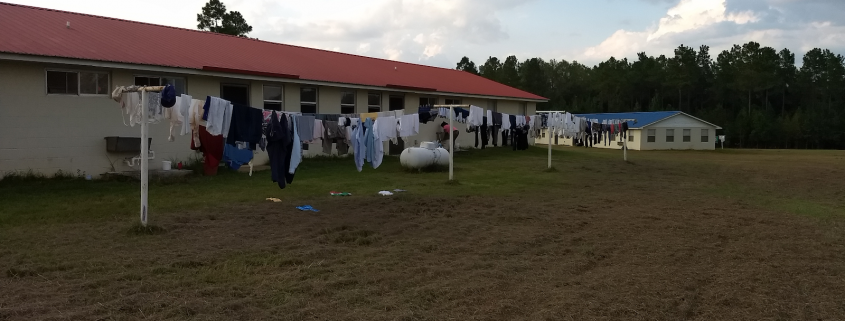Each year, my church takes a small busload of youth to this community, where they work alongside a program that provides mobile healthcare to immigrant farm workers. I’ve gone with my church twice on these journeys, and it has opened my eyes to the so-called “invisible” labor behind the sweet potatoes, cranberries, and green beans at our Thanksgiving table.
Below are a few journal entries I wrote during one of these trips.
Monday: South Georgia in the summer is hot. Ninety-five degrees with the sun blazing down, unobscured by a single cloud. Today, we visited a cucumber farm. No amount of reading or my own imagination prepared me for what I saw. It hurt my heart. A harvesting apparatus stretched across the field perpendicular to the rows of cucumber plants. Surrounding the apparatus, were about 20 men. Even in the extreme heat, their bodies were covered from head to foot in cloth to protect them from the sun, bugs, pesticides, and the prickly plants. One man, lacking a hat, had his head wrapped in a t-shirt. Another man’s face was completely covered except for his eyes. They had to pick as fast as the harvester moved, and it moved at a pretty good clip. We got to try it a bit ourselves. The plants scratched our hands. The buckets were heavy, and bending over hurt our backs. These men work from 6:30 in the morning until 8 at night, day after day. Their only “break” is when the harvester moves from row to row. Some go for months without a day off.
Tuesday: The evening clinic is held at the farm workers’ living quarters, toward the back of a 150-care field. Even though it was late, the sun still held its sizzling power. The four barracks were very simply constructed – they reminded me of a garden shed. The walls had no insulation and no air conditioning. Yet, they housed about 300 male workers. Each barrack is divided into six sections, containing enough bunk beds for roughly a dozen men, a picnic table, a counter top with cook stove and sink, an open pantry shelf for food, a refrigerator, and a few lockers — all sitting atop a hard, concrete floor. The only movement of air I felt was through the windows. The shower and bathroom facilities were located at the end. Outside sat one washing machine. The front yard was full of dusty, fine sand that was easily disturbed, made airborne, and clung to your skin and the inside of your nostrils. The “yard” was enclosed by barbed wire, which the workers used as a clothesline. A grey bus rolled in at 7:30 p.m. — the men had been in the fields since 5 a.m. When we left at 11:30 p.m., another bus rolled in — workers were still coming back “home.”.
Wednesday: Today, a young man brought his reluctant friend to see a doctor. He had been bitten by something in the field that day and his leg, from the knee down, was extremely swollen. He needed to be taken to the hospital, but the “crew leader,” who, evidently, is a profit-making middle-man, didn’t want him to go. A fight ensued, the man was put in a car, driven to the hospital, admitted, and will purportedly be in the hospital an entire week on IV antibiotics to fight a very bad infection. I was told that without medical care, this man could have died.
According to the National Agricultural Workers Survey, one in five farm workers experiences “increased depressive symptoms.” They miss their families, they face mistreatment, and discrimination, but they also experience fear that they won’t be able to meet the extraordinary challenge of the labor.
Many of us still believe that America stands as a place where, if you are willing to work hard, you can start over or start a new life. These workers, many of whom are legal and some of whom are undocumented, work harder hours than anyone I know to produce the food my family eats. I owe them more than my gratitude. I owe them justice.
As your Georgia state senator, I will work to create laws and policies that end this “invisible” labor and the human exploitation it can cause. And until then, every time I see a cucumber, I will think of heat, dust, sweat, toil, and a promise, one day, of a better life.



